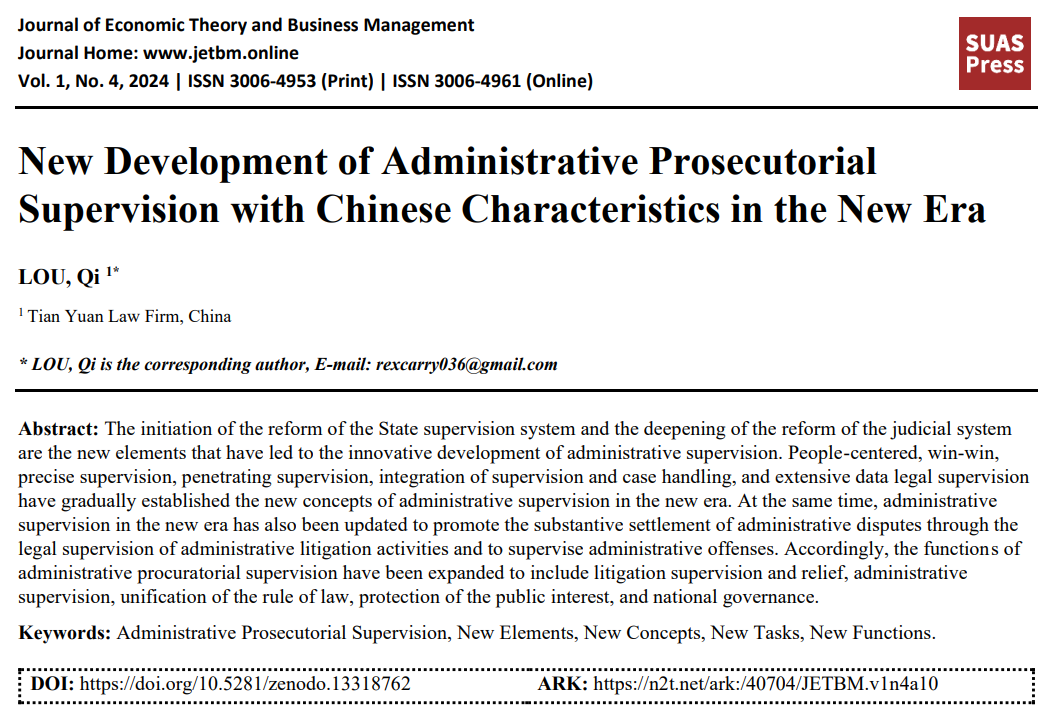New Development of Administrative Prosecutorial Supervision with Chinese Characteristics in the New Era
DOI:
https://doi.org/10.5281/zenodo.13318762ARK:
https://n2t.net/ark:/40704/JETBM.v1n4a10References:
11Keywords:
Administrative Prosecutorial Supervision, New Elements, New Concepts, New Tasks, New FunctionsAbstract
The initiation of the reform of the State supervision system and the deepening of the reform of the judicial system are the new elements that have led to the innovative development of administrative supervision. People-centered, win-win, precise supervision, penetrating supervision, integration of supervision and case handling, and extensive data legal supervision have gradually established the new concepts of administrative supervision in the new era. At the same time, administrative supervision in the new era has also been updated to promote the substantive settlement of administrative disputes through the legal supervision of administrative litigation activities and to supervise administrative offenses. Accordingly, the functions of administrative procuratorial supervision have been expanded to include litigation supervision and relief, administrative supervision, unification of the rule of law, protection of the public interest, and national governance.
References
Neumann Jr, R. K. (1978). The New Era of Administrative Regularization: Controlling Prosecutorial Discretion Through the Administrative Procedure Act. U. Dayton L. Rev., 3, 23.
Mihálik, J., & Šramel, B. (2018). Supervision of public prosecution service over public administration: the case study of Slovakia. Public Policy & Administration/Viesoji Politika ir Administravimas, 17(2).
Montana, R. (2009). Paradigms of judicial supervision and coordination between police and prosecutors: the Italian case in a comparative perspective. Eur. J. Crime Crim. L. & Crim. Just., 17, 309.
Šramel, B. (2017). Metamorphoses of prosecutorial supervision over public administration. Slovak Journal of Public Policy and Public Administration, 4(1).
Barkow, R. E. (2013). Prosecutorial administration: Prosecutor bias and the Department of Justice. Va. L. Rev., 99, 271.
Sklansky, D. A. (2016). The nature and function of prosecutorial power. J. Crim. L. & Criminology, 106, 473.
Mousakhani, M., Me'marzadeh Tehran, G., & Rahmani, H. (2013). Administrative corruption: Providing a fuzzy inference system of good governance to combat corruption. In 2013 13th Iranian Conference on Fuzzy Systems (IFSC) (pp. 1-6). IEEE.
He, Y., Jiang, R., Ni, X., Xu, S., Chen, T., & Feng, J. (2023). Blockchain-based access and timeliness control for administrative punishment market supervision. IEEE Internet of Things Journal, 10(12), 11054-11067.
Liu, F., & Gao, J. (2021). Internet financial risk analysis and supervision suggestions. In 2021 2nd International Conference on E-Commerce and Internet Technology (ECIT) (pp. 446-449). IEEE.
Niu, M., & Jiang, J. (2009). On some legal problems of third-party electronic commerce platforms in China. In 2009 International Conference on Information Science and Engineering (pp. 2980-2982). IEEE.
Zhang, J., He, F., Liu, J., Feng, S., Zhu, Y., & Li, J. (2021). The whole-chain industrial product quality and safety supervision method is based on a knowledge graph. In 2021 IEEE International Conference on Industrial Application of Artificial Intelligence (IAAI) (pp. 74-78). IEEE.

Downloads
Published
How to Cite
Issue
Section
ARK
License
Copyright (c) 2024 The author retains copyright and grants the journal the right of first publication.

This work is licensed under a Creative Commons Attribution 4.0 International License.

















